Are There Animals That Do Not Sleep
Written past: Lindsey O'Connell
What's in the Story?
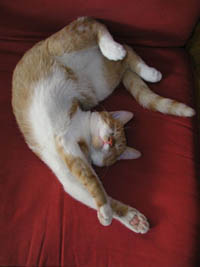
Cat naps definitely count as sleep.
Have you ever wondered how fish and dolphins sleep? Or why your best friend likes to sleep for 12 hours when you lot would rather sleep for eight hours? If you have, then yous are in good visitor because many scientists have wondered the same thing. In the PLOS Biological science commodity, "Is Sleep Essential?," scientists talk over whether sleep is necessary for all species, and if and then, why sleep is and so of import.
How Do Nosotros Define Sleep?
Sleep is pretty much universal. Practically every animal sleeps in one style or another. Sleep seems to be common sense for keeping bodies good for you. If it weren't, why would nosotros experience tired?
Nonetheless, sleep is not as simple as that. Many scientists believe that sleep serves a really important purpose but they haven't institute what that purpose is yet. Scientists are looking at a variety of explanations. Mayhap sleep is simply a dainty pastime – like playing baseball game or watching tv set – that is useful for keeping united states of america out of trouble but not necessarily for good health.
With multiple ideas about why animals sleep, offset scientists had to decide what counts as sleep. The scientists defined sleep as existence still and having little to no reaction to attempts to awaken. The scientists looked at three different means that animals sleep to see if it is true that some animals really don't demand slumber. They examined:
- Animals that don't need sleep (bullfrogs and dolphins)
- Animals that don't need rebound slumber after using up all their free energy (bees)
- Animals that show harmful side furnishings from sleep deprivation (humans)
Bullfrogs…
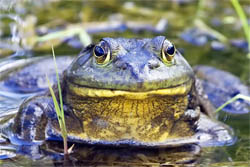
No residuum for the Bullfrog.
The bullfrog was chosen equally an animal that doesn't sleep because when tested for responsiveness by being shocked, it had the same reaction whether awake or resting. However, there were some problems with how the bullfrogs were tested. These problems convinced the scientists at that place wasn't enough evidence that bullfrogs didn't slumber.
And Dolphins…
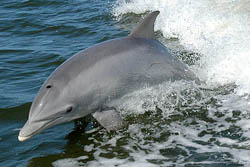
Only one-half of a dolphin'south brain sleeps at a time.
The dolphin was also considered a special case because dolphins have the ability to put only one-half their brains to slumber at a time. The half-comatose brain made it hard to mensurate response time and made scientists offset to question their initial definition of sleep. Recollect, part of being comatose ways being still, and since dolphins however swam around it seemed that they did not fit into that category. However, when scientists measured dolphins' brain waves they saw that the patterns were like to brains that were comatose, at least in half of the encephalon.
And Bees…
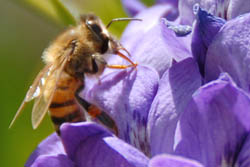
Are bees masters of cheating sleep?
Next, scientists looked for animals that didn't need to take hold of upward on sleep later being awake for a long time. They found a few animals like bees that seemed to non need actress slumber. Yet, the scientists decided the experiments done were flawed because only the length of sleep was tested, not the quality of sleep. This was problematic because many animals regulate sleep by sleeping deeper, not longer, and then they ruled out the inquiry as proof of animals that don't demand to make up sleep.
Hither is a tabular array from the original article that lists all the animals the scientists thought were examples of not sleeping or not using rebound slumber. The first column looks at animals that run into the definition of slumber, the second column looks at whether the animals brand upwards their slumber and the third cavalcade talks about why the animals were considered special cases.
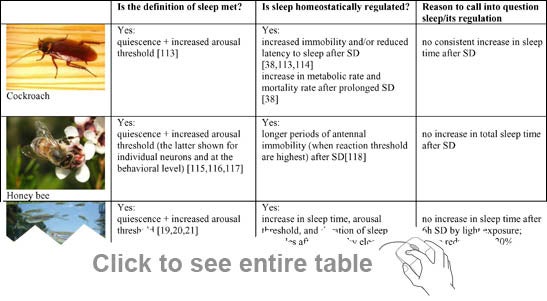
Oh My!
Finally, scientists looked at whether not sleeping has serious consequences. In studies where people went without sleep, they establish that people became one-half-awake, kind of like zombies walking around mindlessly. The scientists also plant that sleep-deprived people got so tired they fell comatose no matter what they were doing. Sometimes, people fell comatose while driving and that is really unsafe! Obviously, the scientists decided that not sleeping is bad for your health.
So We Demand Sleep, But Why?
Don't wake a sleeping tiger!
In the end, the scientists concluded that sleep must accept some kind of necessary function; otherwise, it would non be universal and it would not be damaging to our health to go without slumber. The next step is to effigy out what exactly sleep does.
The scientists think that nevertheless sleep affects the torso, the major function of sleep is the aforementioned in every animal. This means they believe that slumber evolved early on because it helps all animals live better lives. The scientists also think that the office of slumber has something to do with the brain considering that is the role of the body that is afflicted most by the lack of sleep.
Other scientific studies nearly memory aid back up the idea that sleep is important for the brain past showing that sleep helps usa retain more than information. Merely recollect, if scientists can discover how sleep works, maybe one solar day we tin can utilize that information to make studying easy!
Sleeping Baby from Wikimedia - past D. Sharon Pruitt
Source: https://askabiologist.asu.edu/plosable/who-needs-sleep-anyway#:~:text=Bullfrogs%E2%80%A6,reaction%20whether%20awake%20or%20resting.
Posted by: trudeauthersece.blogspot.com

0 Response to "Are There Animals That Do Not Sleep"
Post a Comment